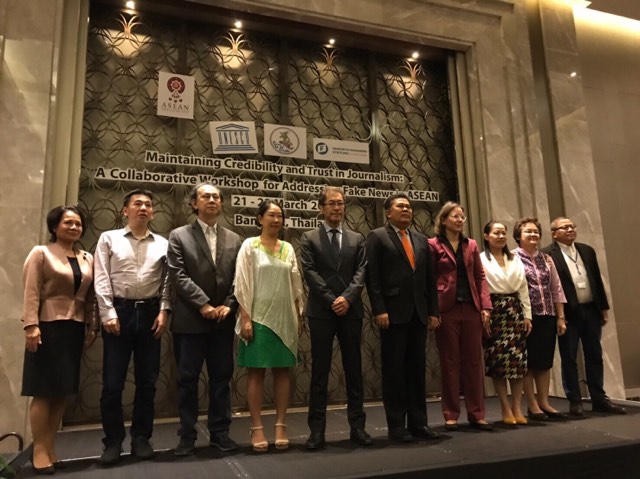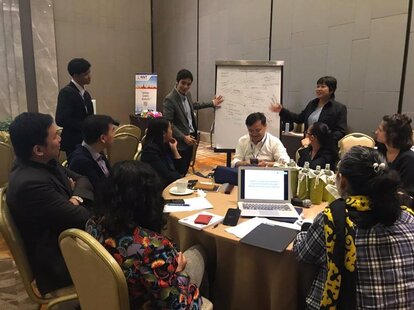Fake News
Maintaining Credibility and Trust in Journalism: Fake News in ASEAN

Digitalization brings a lot of opportunities to the world community in many sectors of life. However the development of digital media and digital literacy, have facilitated as well the spread of fake news and disinformation in various forms. On 21-22 March 2019, Friedrich Naumann Foundation (FNF) Thailand in cooperation with the Government Public Relations Department of Thailand held a Workshop under the title “Maintaining Credibility and Trust in Journalism: A Collaborating Workshop Addressing Fake News in ASEAN”. The workshop was opened by Deputy Director-General of the Government Public Relations Department of Thailand Dr. Charoon Chaisorn, Head of Thailand and Myanmar office of FNF Mrs. Katrin Bannach and followed with keynote message from Director of UNESCO Bangkok Mr.Shigeru Aoyagi. The participants were journalists from ASEAN member states.
Information are interesting things that can be accessed easily in this digitalization era. It means that more information, more chances as well for community to develop. Unfortunately, the process of creating and spreading information itself, mostly are used for certain political goals. The Director of UNESCO Mr. Shigero Aoyagi required all the Journalists to be responsible for the news they are creating, in a way that Journalists must ensure the quality of the information.
The introduction of internet in Southeast Asia was started in 1995. Since then, the Southeast Asia community became familiar and addicted to the use of internet. In 2016 the term of “fake news“ aroused during the presidential election in US, where Donald Trump succeeded beating former US first lady Hilary Clinton. According to Dr. James Gomez, Chair, Board of Directors Asia Center, fake news consists of three part groups. Disinformation, which is created intentionally to harm certain person, people, group, community, organization and nation; disinformation which is false information but not intentionally created to harm people and last one is information which is made by the fact that can be used for good or bad purpose. Fake news as defined by Axel Gilbert (2018) as a deliberate presentation of false or misleading claims as news, where the claims are misleading by design. It has to be false, intentionally designed to be false and it must be disseminated in a volume equivalent to that of news (i.e. attending wide circulation).

The question is how to face the challenges of information disorders in ASEAN? Starting June 2017, ASEAN governments have established task forces or agencies to monitor online discourses, convened public or select committee hearings, and have proposed revisions or new laws, proposed legislation on cyber security and fake news, imposed heavy penalties, such as 1 to 12 years jail time and paying fines ranging from USD 62,000 to USD 123,000.
Fake news is currently happening in ASEAN member states, and it’s been recorded that it will be massive prior the election time. In May 2018 ASEAN Ministers who are responsible for information agreed in a joint a media statement –Section Combating Fake News, to collaborate and exchange best practices to combat fake news and mitigate the effects. It is mentioned on Annex 5 of the Joint Statement: Framework and Joint Declaration to Minimize the Harmful Effect of Fake News in ways no central regulation or control in content; impact on political institutions and social harmony; share policy experiences related to social media; promote media literacy and public awareness and; adopt laws and regulations for their national situation and plans to use civil society groups to run digital literacy campaigns and mobilise citizens to proactively report fake news so governments can clarify their positions.
Journalists play such a crucial role in addressing the prevalence of information disorder. They’re responsible for learning and understanding the digital media and its platforms. Their tasks are not only to create real news and combating fake news, but also making the internet safe for all users. What’s the key of creating real news and providing real facts of the information to the community? The key is the quality of Journalist itself, said by Mr. Kavi Chongkittavorn, Media Professional Specialist on the panel discussion. While Dr. Masato Kajimoto, Assistant Professor, Journalisms and Media Studies Centre, University of Hong Kong added that even trust is not the key, we can’t just give our trust to the journalists for the information they provide. “When your mother says the pizza is in the fridge, you believe it because you trust her. But do you actually check whether the pizza is really in it? It’s the same for news,” said Dr. Kajimoto. John Nery, the Columnist of Philippines Daily Inquirer informed that lies and disinformation travel the old routes in many parts of ASEAN member states. There’s urgency for the journalists to really look beyond the problem of disinformation on digital platforms and social media.
We, as the society are most of the time receiving overload information. The information appears in several forms such rumors, gossips, facts, and opinions. Sometimes we cannot distinguish between fact and opinion. In the intense political debate about election for example, we received a lot of information and unfortunately we do not have fact checking mechanism. In order to make sure the quality of journalists, they must possess these 4 aspects: verification, accountability, transparency, and independence. When it comes to creating or providing information, journalists must be aware of why this information matters for the society, what would be the effect for the society and they have to do the fact checking to prevent the information disorder. Journalists are the first party who are responsible of the quality of information, whether it’s real news or fake news. However to deal with the spread of fake news, audience has a big role in this part. Critical thinking is always needed and never trust any information easily.